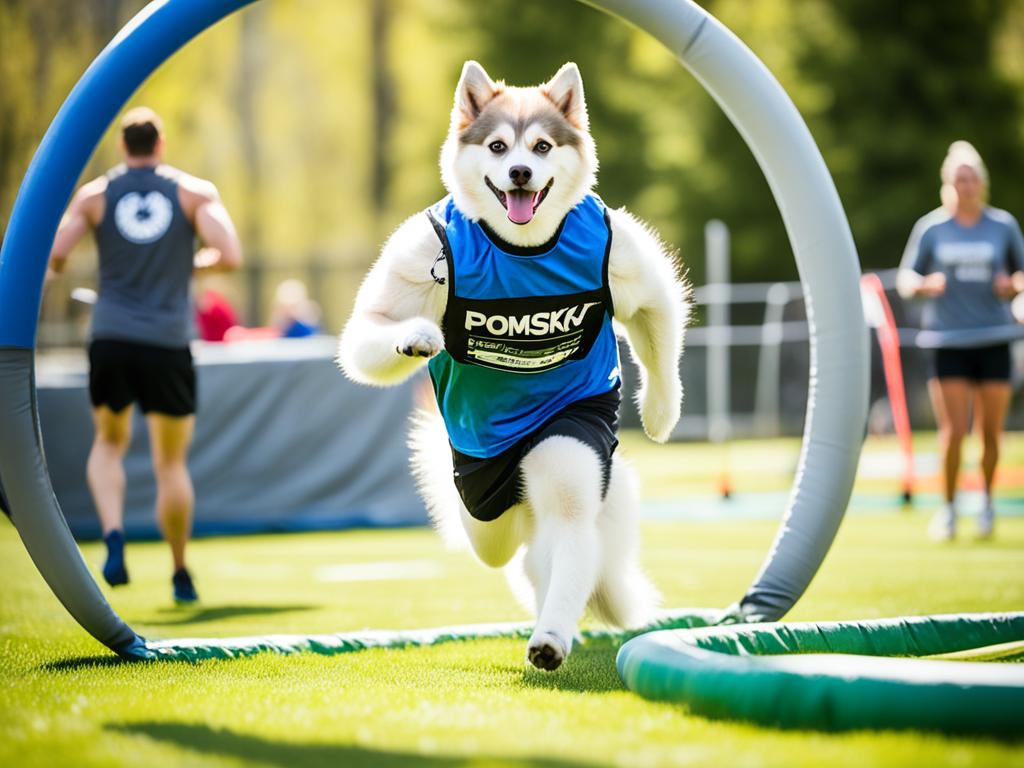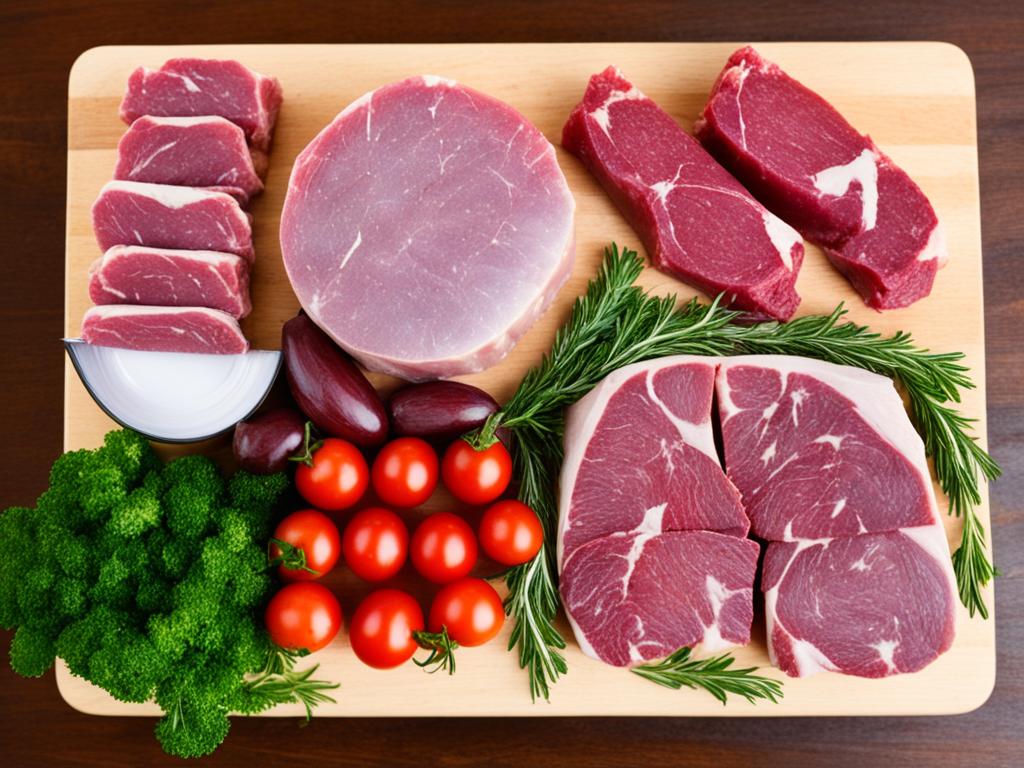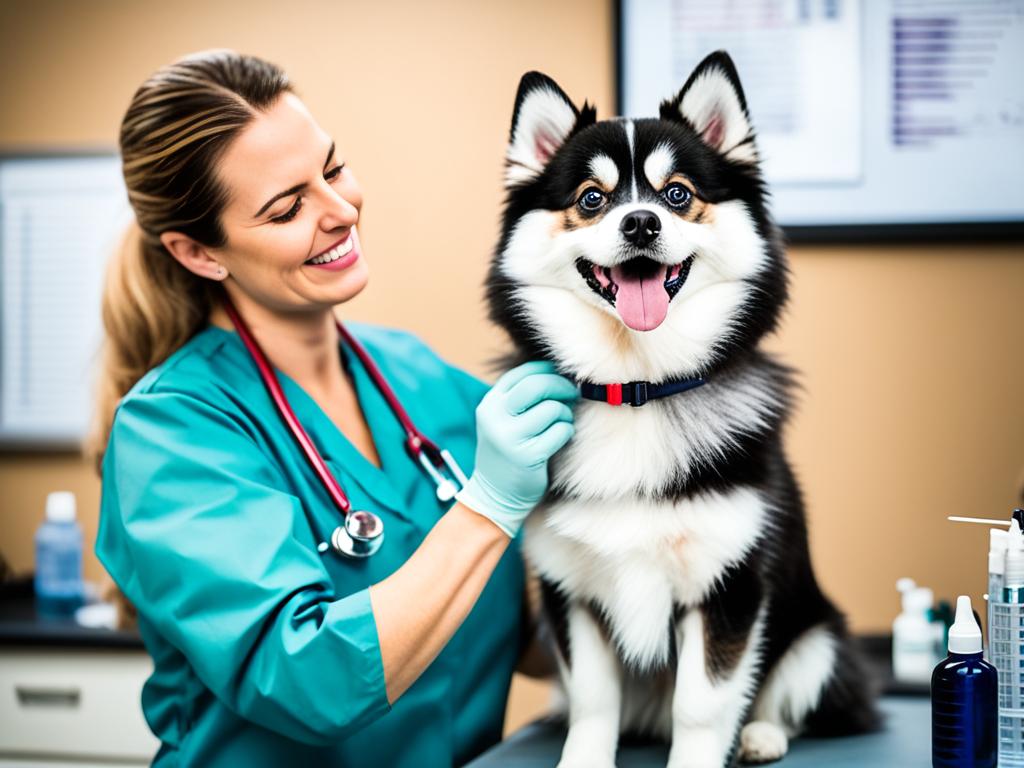Did you know that Pomskies, the popular designer dog breed that is a mix between a Pomeranian and Siberian Husky, require proactive health care to ensure their well-being? These adorable and energetic dogs may be prone to specific health issues and require special attention to maintain their overall health and happiness.
In this article, we will explore expert advice on managing common health concerns and provide tips for maintaining the overall health and well-being of your Pomsky. From nutrition and grooming to training and exercise, we’ll cover everything you need to know to ensure your Pomsky leads a healthy and fulfilling life.
Key Takeaways:
- Proactive health care is essential for Pomskies to prevent and manage potential health issues.
- Providing a balanced and complete diet, regular grooming, and ample exercise are vital for Pomsky health maintenance.
- Pomskies require early training and socialization to promote good behavior and mental well-being.
- It’s important to be aware of common health concerns in Pomskies and choose a reputable breeder to avoid genetic health issues.
- Consulting with a veterinarian or canine nutritionist can provide further guidance on Pomsky health care.
Physical Characteristics of Pomskies
Pomskies are a unique designer dog breed that inherits physical traits from both the Pomeranian and Siberian Husky. They come in a variety of sizes, weights, colors, and patterns, making each Pomsky truly unique and adorable.
Pomsky Size and Weight
The size and weight of a Pomsky can vary depending on the genetics inherited from its parent breeds. On average, male Pomskies can measure between 10-18 inches in height and weigh around 20-30 pounds. Female Pomskies can have similar height and weight ranges. However, it’s important to note that individual Pomskies may not fall within these average ranges and can be smaller or larger.
Pomsky Physical Traits
Due to their mixed heritage, Pomskies display a combination of physical traits from both the Pomeranian and Siberian Husky breeds. They often have a compact and sturdy build, resembling a miniature version of a Husky. Pomskies typically have a double coat that is soft, silky, and often fluffy. Their coat colors and patterns vary, with the most desired ones resembling a Husky with blue eyes.
Pomsky Colors and Patterns
Pomskies come in a wide range of colors and patterns, resulting from the mixing of Pomeranian and Husky genetics. Some common colors include black, white, gray, cream, brown, and red. Pomskies can also have various patterns, such as solid, sable, merle, and parti-color. The combination of different colors and patterns adds to the uniqueness and charm of each Pomsky.
Overall, Pomskies are a visually appealing breed with a wide range of physical characteristics. Their diverse sizes, weights, colors, and patterns make them stand out and captivate the hearts of dog lovers everywhere.
| Color | Pattern |
|---|---|
| Black | Solid |
| White | Sable |
| Gray | Merle |
| Cream | Parti-color |
| Brown | |
| Red |
Pomsky Nutrition
Providing a balanced and complete diet is crucial for the overall health of your Pomsky. It’s important to understand the nutritional needs of your Pomsky and choose the right diet to meet those needs. The Association of American Feed Control Officials (AAFCO) sets standards for optimum pet nutrition, so selecting AAFCO-approved dog food is a reliable way to ensure your Pomsky’s dietary requirements are met.
A balanced Pomsky diet should consist of proteins, carbohydrates, healthy fats, vitamins, and minerals. Proteins are essential for muscle growth and repair, while carbohydrates provide energy. Healthy fats support a shiny coat and healthy skin. Vitamins and minerals are important for proper immune function and overall well-being.
Consulting with a veterinarian or canine nutritionist can provide valuable guidance in selecting the best diet for your Pomsky. They can assess your dog’s specific nutritional needs, taking into account factors such as age, weight, activity level, and any existing health conditions.
Here is a breakdown of the components that should be included in a balanced and complete diet for Pomskies:
Proteins
Proteins are the building blocks of muscle and essential for a strong and healthy Pomsky. Good sources of protein for Pomskies include:
- High-quality lean meats like chicken, turkey, and fish
- Eggs
- Greek yogurt
- Cottage cheese
Carbohydrates
Carbohydrates provide energy for your Pomsky’s daily activities. Choose complex carbohydrates that are easily digestible, such as:
- Sweet potatoes
- Brown rice
- Oatmeal
- Quinoa
Healthy Fats
Healthy fats are important for Pomsky’s coat health and overall well-being. Good sources of healthy fats include:
- Salmon and other fatty fish
- Flaxseed oil
- Coconut oil
- Avocado
Vitamins and Minerals
Pomskies require a variety of vitamins and minerals to support their overall health. Incorporate the following foods into your Pomsky’s diet to ensure they receive an adequate supply of essential nutrients:
- Fruits such as blueberries and apples
- Vegetables like spinach, carrots, and broccoli
- Pumpkin and sweet potato contain fiber and are beneficial for digestion
| Nutrient | Food Sources |
|---|---|
| Protein | Chicken, turkey, fish, eggs, Greek yogurt, cottage cheese |
| Carbohydrates | Sweet potatoes, brown rice, oatmeal, quinoa |
| Healthy Fats | Salmon, flaxseed oil, coconut oil, avocado |
| Vitamins and Minerals | Fruits (blueberries, apples), vegetables (spinach, carrots, broccoli), pumpkin, sweet potato |
Remember to provide fresh, clean water at all times to keep your Pomsky hydrated. Monitoring your Pomsky’s weight and adjusting their diet accordingly can help maintain their health and prevent weight-related issues. Remember to consult with a veterinarian or canine nutritionist to ensure your Pomsky’s specific nutritional needs are being met.

Grooming Tips for Pomskies
Pomskies, with their soft, silky, and fluffy double coat, require regular grooming to keep them looking and feeling their best. In this section, we will provide you with essential grooming tips to ensure the well-being of your Pomsky. From coat care to shedding management, we’ve got you covered.
Pomsky Coat Care
Proper coat care is crucial for Pomskies to maintain a healthy and beautiful coat. Here are some key tips:
- Brush their coat at least once a week with a brush suitable for their fur type. This helps prevent matting and tangles, keeping their coat in good condition.
- During shedding season, which typically occurs twice a year, daily brushing is recommended. This helps remove loose hair and reduces the amount of fur around your home.
- Consider using a detangling spray or conditioning mist to make brushing easier and to keep the coat silky and manageable.
- If you notice any knots or tangles that are difficult to remove, gently work them out with your fingers or seek the help of a professional groomer.
Pomsky Shedding
Pomskies are known to shed heavily, especially during seasonal changes. To manage shedding, follow these tips:
- Regular brushing helps remove loose fur and reduces shedding. Use a deshedding tool or a slicker brush to effectively remove excess hair.
- Consider using a high-quality deshedding shampoo and conditioner to further minimize shedding and keep the coat healthy.
- Provide a healthy diet rich in omega-3 fatty acids, which can improve coat health and reduce excessive shedding.
- Invest in lint rollers or pet hair removers to keep your furniture and clothing free from unwanted fur.
Pomsky Teeth Brushing
Maintaining good dental hygiene is essential for the overall health and well-being of your Pomsky. Follow these tips for proper teeth brushing:
- Brush your Pomsky’s teeth at least 2-3 times a week using a dog-friendly toothbrush and toothpaste. Regular brushing helps prevent plaque buildup, gum disease, and bad breath.
- Start teeth brushing from an early age to get your Pomsky accustomed to the process.
- If your Pomsky refuses to cooperate, consider using dental chews or treats that promote oral health.
- Regular dental check-ups with a veterinarian are also important to detect any dental issues early on.
In addition to coat care and teeth brushing, don’t forget to regularly trim your Pomsky’s claws to maintain their overall hygiene and prevent any discomfort. If you’re unsure about the best grooming practices for your Pomsky, consult with a professional groomer or a veterinarian who can provide you with expert guidance.
| Grooming Tips | Frequency |
|---|---|
| Brush their coat | At least once a week |
| Brush their coat during shedding season | Daily |
| Use detangling spray or conditioning mist | As needed |
| Work out knots or tangles | As needed |
| Regular brushing to manage shedding | As needed |
| Use deshedding shampoo and conditioner | As needed |
| Provide a diet rich in omega-3 fatty acids | Ongoing |
| Brush your Pomsky’s teeth | 2-3 times a week |
| Start teeth brushing from an early age | Ongoing |
| Trim your Pomsky’s claws | As needed |
Training and Exercise for Pomskies
Pomskies are intelligent and energetic dogs that require proper training and exercise to ensure their well-being and prevent behavioral issues. By providing them with positive reinforcement and engaging in regular physical activities, you can help them thrive and be happy companions.
Training your Pomsky
- Start training your Pomsky as early as possible to establish good behaviors and socialization.
- Use reward-based training methods, such as treats and praise, to motivate and reinforce positive behaviors.
- Avoid using negative reinforcement or punishment-based training, as it can lead to fear and aggression in Pomskies.
- Enroll your Pomsky in obedience classes or hire a professional dog trainer to ensure effective and consistent training.

Exercise and playtime
Pomskies have high energy levels and need plenty of physical and mental stimulation to stay happy and healthy. Here are some tips for providing them with adequate exercise and playtime:
- Give your Pomsky at least an hour of active playtime each day, such as playing fetch, going for walks, or engaging in interactive games.
- Provide them with toys that challenge their intelligence and keep them mentally stimulated.
- Consider agility training or participating in dog sports like dock diving or flyball to provide additional physical exercise.
- If your Pomsky is showing signs of behavioral issues or restlessness, increase their exercise routine or consult with a veterinarian or professional dog trainer for guidance.
By incorporating regular training sessions and exercise into your Pomsky’s routine, you can help them develop into well-mannered and happy dogs while preventing behavioral issues caused by boredom or excess energy.
Common Health Concerns for Pomskies
Pomskies, like any dog breed, may be susceptible to certain health issues and genetic diseases. While they are generally a healthy breed, it’s important for Pomsky owners to be aware of common health concerns. By being proactive and addressing these concerns, you can ensure the well-being and longevity of your beloved Pomsky.
Hip Dysplasia
Hip dysplasia is a common orthopedic condition that affects many dog breeds, including Pomskies. It occurs when the hip joint fails to develop properly, leading to joint instability and potential arthritis later in life. Regular vet check-ups and maintaining a healthy weight for your Pomsky can help mitigate the risk of hip dysplasia.
Eye Problems
Pomskies are prone to certain eye conditions, such as cataracts and progressive retinal atrophy (PRA). These conditions can cause vision impairment and, in severe cases, lead to blindness. Regular eye examinations by a veterinarian can help detect and manage any eye problems early on.
Allergies
Pomskies can develop allergies to environmental factors, such as pollen, dust mites, or certain foods. Allergies can manifest in various ways, including skin irritation, itching, and respiratory issues. If you notice any allergy symptoms in your Pomsky, consult with a veterinarian to identify and manage the allergens.
Dental Issues
Poor dental hygiene can lead to dental issues in Pomskies, including gum disease, tooth decay, and tooth loss. Regular teeth brushing and routine dental cleanings by a veterinarian can help prevent dental problems and promote good oral health for your Pomsky.
Pomsky Lifespan
The average lifespan of a Pomsky is estimated to be around 13 to 15 years. However, it’s important to note that individual genetics and overall health maintenance play a significant role in determining the lifespan of a Pomsky. By providing proper care, nutrition, and regular veterinary check-ups, you can help maximize the lifespan of your Pomsky.
Choosing a Reputable Pomsky Breeder
When getting a Pomsky, it’s crucial to choose a reputable breeder who prioritizes the health and well-being of their dogs. Reputable breeders may offer health guarantees for their Pomskies, ensuring that they have been bred with care and undergo necessary health screenings. Researching and selecting a reputable breeder can reduce the risk of purchasing a Pomsky with certain genetic health issues.
| Health Concern | Description |
|---|---|
| Hip Dysplasia | Occurs when the hip joint fails to develop properly, leading to joint instability and potential arthritis later in life. |
| Eye Problems | Pomskies are prone to eye conditions such as cataracts and progressive retinal atrophy (PRA). |
| Allergies | Pomskies can develop allergies to environmental factors and certain foods, leading to skin irritation and respiratory issues. |
| Dental Issues | Poor dental hygiene can cause gum disease, tooth decay, and tooth loss in Pomskies. |
Being proactive about your Pomsky’s health is key to ensuring a happy and healthy companion. Regular vet check-ups, proper dental care, and a balanced diet are essential for maintaining your Pomsky’s overall well-being. By addressing common health concerns and choosing a reputable breeder, you can enjoy many years of joy and companionship with your Pomsky.
The Benefits of a Raw Meat Diet for Pomskies
Pomskies can benefit from a raw meat diet that replicates the natural dietary habits of their ancestors. Feeding your Pomsky raw meat provides several advantages that promote their overall health and well-being.
Enhanced Nutritional Value
A raw meat diet for Pomskies offers enhanced nutritional value compared to commercial dog food. Raw meat is rich in proteins, essential fatty acids, vitamins, and minerals that support optimal growth, muscle development, and overall vitality. By feeding your Pomsky a raw meat diet, you can ensure that they receive the necessary nutrients for a healthy life.
Improved Coat and Skin Health
A raw meat diet can contribute to improved coat and skin health in Pomskies. The nutrients present in raw meat, such as omega-3 fatty acids, help nourish the skin, reduce itchiness, and promote a shiny and lustrous coat. By providing a raw meat diet, you can help your Pomsky maintain a healthy and vibrant appearance.
Better Dental Health
The act of chewing raw meat helps stimulate the production of saliva, which naturally cleanses your Pomsky’s teeth and gums. This can aid in preventing dental issues such as tartar buildup, gum disease, and tooth decay. A raw meat diet can contribute to better dental health, promoting fresh breath and preventing oral discomfort for your Pomsky.
Higher Energy Levels
Pomskies are energetic dogs that require the right fuel to stay active and lively. Raw meat provides high-quality proteins and fats that can support your Pomsky’s energy needs. By feeding them a raw meat diet, you can help ensure that they have the energy to engage in their favorite activities and maintain a healthy weight.
Easier Digestion
Raw meat is easier for dogs to digest compared to heavily processed commercial dog food. The natural enzymes present in raw meat aid in the breakdown and absorption of nutrients, reducing the strain on your Pomsky’s digestive system. As a result, a raw meat diet can help alleviate common digestive issues and promote healthy digestion in Pomskies.

While the benefits of a raw meat diet for Pomskies are significant, it’s crucial to do thorough research and consult with a veterinarian to ensure the diet is balanced and meets your Pomsky’s specific nutritional needs. A professional can provide guidance on meal planning and supplementation to ensure your Pomsky receives all the necessary nutrients for optimal health.
Choosing the Right Raw Meat for Pomskies
Feeding your Pomsky a raw meat diet can provide numerous health benefits. However, it’s crucial to choose the right types of meat to ensure a balanced and nutritious diet. Here are some options to consider:
- Beef: Rich in protein and essential nutrients, beef is a popular choice for raw feeding. It provides amino acids, iron, and zinc, promoting muscle development and overall health.
- Chicken: A lean source of protein, chicken is readily available and affordable. It is also low in fat and a good source of vitamins B6 and B12.
- Lamb: Lamb meat offers a unique flavor and is packed with nutrients like zinc, iron, and vitamin B12. It’s a great option for dogs with food sensitivities.
- Fish: Consider including fish like sardines or mackerel in your Pomsky’s diet. Fish is an excellent source of omega-3 fatty acids, promoting healthy skin, coat, and joints.
- Turkey: Turkey is a lean, high-protein meat that provides essential amino acids. It also contains nutrients like iron, zinc, and phosphorus.

Each type of meat offers different nutritional benefits, so it’s important to provide a variety to ensure your Pomsky receives a balanced and complete diet. Consult with a veterinarian or canine nutritionist to determine the appropriate ratios and quantities of different meat types for your Pomsky’s specific needs.
**Table: Nutritional Comparison of Raw Meat Options for Pomskies**
| Nutrient | Beef | Chicken | Lamb | Fish | Turkey |
|——————-|————|————|————-|———–|———–|
| Protein | High | High | High | High | High |
| Omega-3 Fatty Acids | Low | Low | Low | High | Low |
| Iron | High | Moderate | Moderate | Moderate | Moderate |
| Zinc | High | Moderate | Moderate | Moderate | Moderate |
| Vitamin B12 | High | Moderate | Moderate | Low | Moderate |
*Table: Nutritional Comparison of Raw Meat Options for Pomskies*
Ensure that the raw meat you choose is fresh and comes from a reliable source to reduce the risk of bacterial contamination. Pay attention to your Pomsky’s reactions and adjust their diet as needed. Monitoring their overall health and consulting with professionals will help you provide the best raw meat options for your beloved Pomsky.
Recognizing and Avoiding Pomsky Breeder Scams
Unfortunately, the world of dog ownership is not immune to scams, and Pomsky breeders are no exception. Being aware of the signs of a scam and taking necessary precautions is crucial to avoid falling victim to Pomsky breeder scams.
- Unrealistic promises and prices: If a breeder is offering Pomskies at significantly lower prices or making unrealistic promises regarding the appearance or temperament of the puppies, it could be a red flag.
- Copy-pasted testimonials: Look out for breeders who use suspiciously similar testimonials on their websites or social media platforms. This could indicate that the testimonials are fabricated or copied from other sources.
- Websites lacking credibility: Poorly designed websites, lack of contact information, and absence of breeder credentials or certifications can be indicators of a scam. Legitimate breeders typically have professional websites that provide detailed information about their breeding practices and contact information.
- Requesting deposit payments: Some scammers may ask for a deposit payment to secure a Pomsky puppy, only to disappear once the payment is made. Reputable breeders usually require deposit payments as part of the purchasing process, but it’s essential to verify the breeder’s credibility before making any payments.
- Providing false information: Dishonest breeders may provide inaccurate information about the Pomsky’s lineage, health history, or even their very existence. It’s crucial to thoroughly research and verify the information provided by the breeder.
Protecting yourself from Pomsky breeder scams requires doing due diligence. Conduct extensive research, verify the breeder’s credentials and reputation, and reach out to trusted sources within the Pomsky community. Establishing direct communication with breeders, visiting their facilities (if possible), and asking for references can help ensure that you are dealing with a legitimate and responsible breeder.
Tips for Choosing a Reputable Pomsky Breeder
When it comes to finding a Pomsky breeder, selecting a reputable and responsible one is of utmost importance. Here are some valuable tips to guide you in choosing the right breeder for your Pomsky:
- Check for proper credentials: Look for breeders who are approved and recognized by reputable organizations such as the Pomsky Club of America (PCA). This ensures that they adhere to certain standards and guidelines set by the breed’s governing body.
- Research breeders’ backgrounds: Take the time to thoroughly research and evaluate breeders. Look for reviews, testimonials, and feedback from other Pomsky owners to gauge their reputation and credibility.
- Visit their facilities if possible: If feasible, arrange a visit to the breeder’s facility. This allows you to personally assess the living conditions and welfare of the breeding dogs and puppies. A well-maintained and clean environment is a positive sign.
- Ask for references: Request references from previous customers or other reputable individuals within the Pomsky community. Contact these references to inquire about their experience with the breeder and the health and temperament of the Pomskies they have acquired.
By following these tips, you can make an informed decision when choosing a Pomsky breeder who prioritizes the health and well-being of their dogs. Remember, investing time and effort into finding a reputable breeder ensures that you welcome a healthy and happy Pomsky into your family.
Conclusion
In conclusion, taking proactive measures for the health care of your Pomsky is crucial in ensuring their overall well-being. By following a balanced diet, providing regular grooming and exercise, and implementing proper training and socialization, you can contribute to the longevity and happiness of your Pomsky. It is essential to stay updated on common health concerns and choose reputable breeders or sellers to avoid scams and genetic health issues.
Consulting with a veterinarian or canine nutritionist can provide valuable guidance in maintaining the health of your Pomsky. They can offer expert advice on nutrition, preventive care, and any specific health concerns that may arise. Regular check-ups and vaccinations are also essential in keeping your Pomsky in optimal health.
By prioritizing your Pomsky’s health care needs, you can create a loving and nurturing environment that promotes their overall well-being. Remember to provide a safe and stimulating environment, engage in regular exercise and mental stimulation, and shower them with love and affection. The health and happiness of your Pomsky are in your hands, and with proper care, you can enjoy a long and fulfilling companionship.
FAQ
What are the physical characteristics of Pomskies?
Pomskies can vary in size and weight, but on average, they are 10-18 inches tall and weigh 20-30 pounds. They come in a variety of colors and patterns, with the most desired ones resembling a miniature Husky with blue eyes.
What should I feed my Pomsky?
Pomskies require a balanced and complete diet that includes proteins, carbohydrates, healthy fats, vitamins, and minerals. It’s important to choose dog food that is AAFCO approved and consult with a veterinarian or canine nutritionist for guidance on meeting their specific nutritional needs.
How should I groom my Pomsky?
Pomskies have a double coat that requires regular grooming. Brush their coat at least once a week to prevent matting and groom them daily during shedding season. It’s also important to regularly brush their teeth and trim their claws for overall hygiene and dental health.
How should I train and exercise my Pomsky?
Pomskies require early training and socialization. They respond well to reward-based training and positive reinforcement. To fulfill their high energy levels, provide them with at least an hour of playtime and regular exercise such as walks or interactive activities.
What are common health concerns for Pomskies?
Pomskies can be prone to health issues like hip dysplasia, eye problems, allergies, and dental issues. Their average lifespan is around 13-15 years, but it can vary. Researching reputable breeders and staying informed about potential genetic health issues are important.
What are the benefits of a raw meat diet for Pomskies?
A raw meat diet can provide enhanced nutrition, improved coat and skin health, better dental health, higher energy levels, and easier digestion for Pomskies. However, it’s important to research and consult with a veterinarian to ensure a balanced diet.
How do I choose the right raw meat for my Pomsky?
When feeding a raw meat diet, consider options like beef, chicken, lamb, fish, and turkey. Each type of meat offers different nutritional benefits, so providing a variety is important. Ensure the meat is fresh and from a reliable source to avoid health risks.
How can I recognize and avoid Pomsky breeder scams?
Look for red flags such as unrealistic promises and prices, copy-pasted testimonials, lack of credibility on websites, and breeders asking for deposit payments without providing adequate information. Thorough research, verification of credentials, and contacting reputable breeders can help avoid scams.
What tips can you give for choosing a reputable Pomsky breeder?
Check for proper credentials, such as approval from reputable organizations like the Pomsky Club of America (PCA). Research the breeder’s background, visit their facilities if possible, and ask for references to ensure they prioritize the health and well-being of their Pomskies.
How can I ensure the overall health and well-being of my Pomsky?
Providing a balanced diet, regular grooming and exercise, proper training and socialization, staying informed about common health concerns, and choosing reputable breeders or sellers are key to proactive health care for your Pomsky. Consulting with a veterinarian or canine nutritionist can provide further guidance.

Leave a Reply